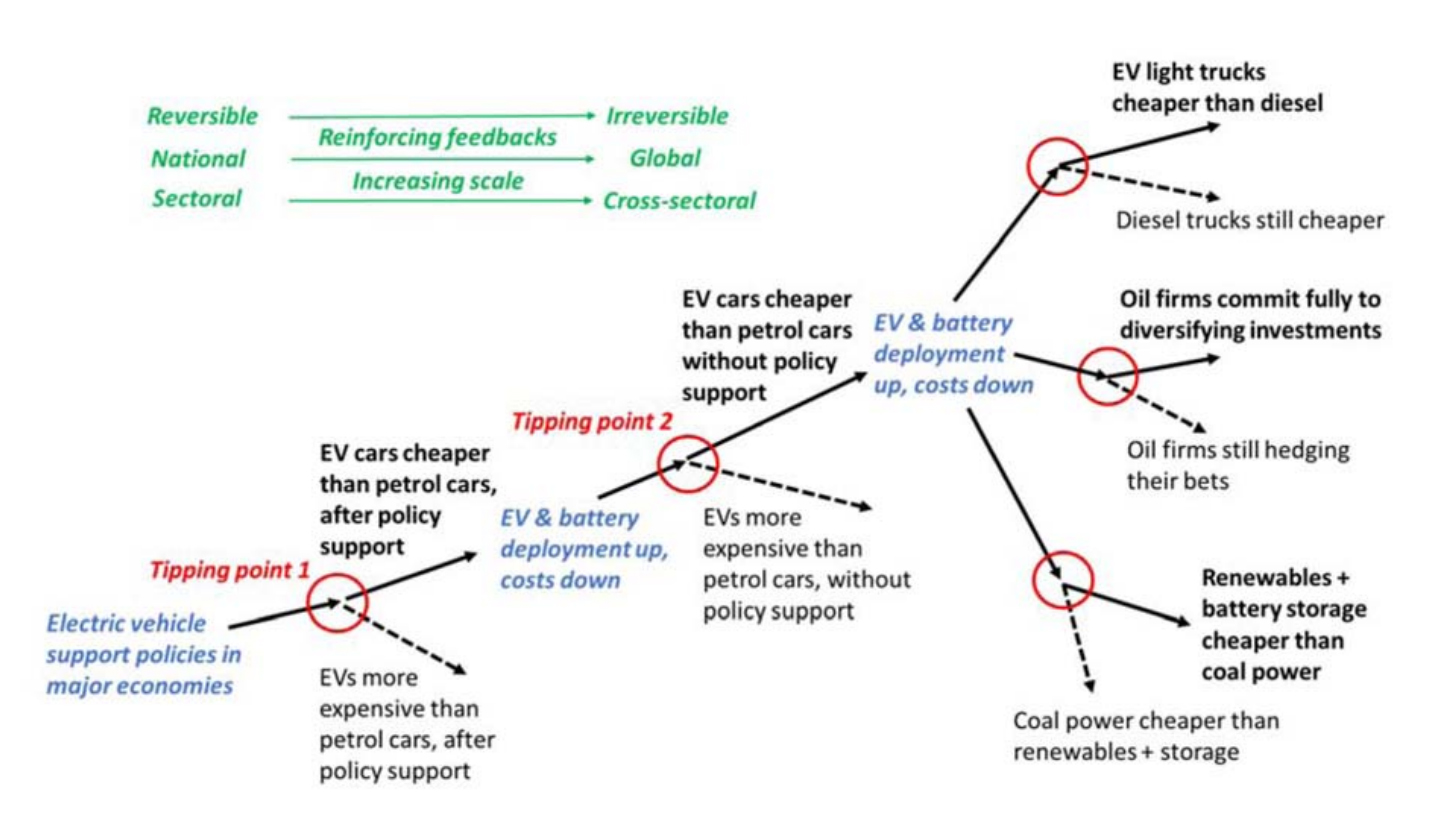If there's one thing the climate crisis has taught us, it's that small things can accumulate and lead to big changes. Like the mouse that sank the boat, just one seemingly insignificant shift at the right time can finally push a system beyond the parameters that maintain it.
We've heard a lot of such tipping points in the context of irreversibly pushing our tottering climate systems in a frightening direction. But to combat this crisis, we do have to trigger massive changes within other complex and interlinked systems: industrial, social, and economic.
So researchers have investigated potential triggers that could create a cascade of beneficial changes to help rapidly curb our emissions.
"We have left it too late to tackle climate change incrementally," said Earth systems scientist Tim Lenton from the University of Exeter in the UK.
"Limiting global warming to well below 2°C now requires transformational change, and a dramatic acceleration of progress."
By focusing on two sectors – light road transport and power – Lenton and colleague Simon Sharpe, Deputy Director of the UK COP 26 unit, identified actions that could help reach tipping points of change within them.
"The power sector needs to decarbonise four times faster than its current rate, and the pace of the transition to zero-emission vehicles needs to double," explained Lenton.
"Many people are questioning whether this is achievable. But hope lies in the way that tipping points can spark rapid change through complex systems."
While coal has already reached a financial tipping point – it's now cheaper to build renewable energy projects than it is to keep running existing coal fleets – a small group of countries is still providing international financing for new coal power plants.
The team identified that an agreement to stop financing these between just three countries – China, Japan, and South Korea – could significantly increase the cost of coal and trigger a cascade of rapid global changes in how we power our lives.
Australia provides a clear example of the importance of government policies: rooftop solar power installations, which were initially subsidised by government policies, are now smashing records, whereas electric vehicles (EVs) that had no such policies are barely seen there at all.
Globally, EVs only account for 2-3 percent of new car sales; in Norway however, electric vehicles now make up to 54 percent. There, gas-powered vehicles are heavily taxed while EVs receive tax exemptions.
If leaders in places with the most car sales, such as California, China, and the EU, adopted similar policies, this would trigger a surge of advancements in manufacturing and make them cheaper, which can continue a cascade of positive changes as outlined below.
 . Electric vehicle tipping cascade. (Letnon & Sharpe, Climate Policy, 2020)
. Electric vehicle tipping cascade. (Letnon & Sharpe, Climate Policy, 2020)
"As EVs become ever cheaper… even governments that care nothing for climate change will want to support the transition in their own countries,' Lenton and Sharpe wrote in their paper.
"Our examples do suggest a plausible route through which a relatively small number of initial actions could catalyse large changes at the global scale."
This requires a change of focus when it comes to making policies that, rather than optimising local conditions, considers global dynamic states, the researchers explain.
What's more, once a cascade is set off in one system, it can help push an interlinked system towards a tipping point, too.
"An EV revolution means batteries get much more abundant and much cheaper – and that helps with the renewable electricity revolution – to balance out uneven supply and demand for renewables," Lenton told Kristin Toussaint at Fast Company.
"That's a reinforcing feedback between the sectors and tipping points."
If we pressure key leaders towards creating more such tipping point policies, we may be able to avoid some of the frightening climate tipping points. But it's also important to remember that even if we do fall beyond some of these thresholds scientists have been warning us about, it by no means prevents us from having the power to still prevent even worse outcomes.
"As bad as the warming has been, it is only one-tenth of the warming we are capable of causing, which would be a hellishly altered Earth," Berkeley climate scientist David Romps stated in the UC Berkley alumni publication California last year.
"Yes, there is cause for mourning: By failing to act over the past 30 years, we have caused irreparable harm to our climate. But that is not an excuse for wrecking the climate even further for all generations to come."
The good news is that we've already reached an important social tipping point – most people in the world now agree climate change matters (contrary to what online 'discussions' would have you believe). This could be further boosted into meaningful change with proof of successful global-wide technological changes.
"If either of these efforts – in power or road transport – succeed, the most important effect could be to tip perceptions of the potential for international cooperation to tackle climate change," Lenton said.
Their research was published in Climate Policy.
